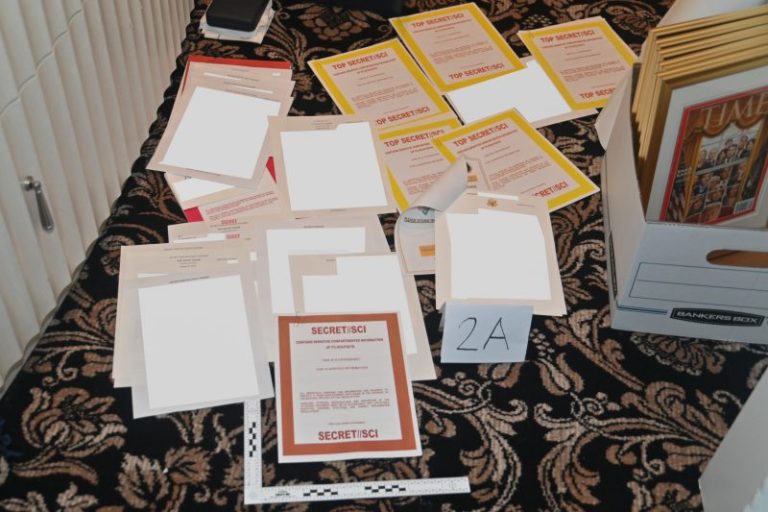Donald Trump’s lawyers provided a more detailed explanation in a court filing Thursday evening as to why they say the former president had the authority to personally declassify sensitive government documents, though they again stopped short of saying Trump actually declassified materials that he kept after leaving the White House.
The legal team’s explanation was included in a 67-page response to the Justice Department’s appeal of a lower court’s decision to appoint an outside arbiter to sift through the thousands of documents seized from Trump’s Florida residence on Aug. 8 to see if any should be shielded from criminal investigators because they are privileged.
Trump’s lawyers acknowledged that there is a process to declassify documents, which they stated includes going to the person who originally classified the document — or to that person’s supervisor — to declassify them.
The president, they said in the filing, would be considered the supervisor of whoever classified any of the documents, some of which deal with the most sensitive government secrets involving countries including Iran and China.
While the argument in the filing is a hypothetical and does not advance what the public knows about the case, it provides a broad window into one possible defense Trump’s legal team may employ if the criminal probe into the presence of the documents at Mar-a-Lago results in criminal charges. The Justice Department is investigating possible mishandling of classified material, obstruction and destruction of government records, and experts say prosecutors have amassed considerable evidence, including witness testimony and video surveillance.
“The Government again presupposes the documents bearing classification markings are, in fact, classified,” Trump’s lawyers said in their appeal response. They later said, “Yet the government contends President Trump, who had unfettered authority to declassify documents, willfully retained classified information in violation of the law.”
The Justice Department asked last month for the U.S. Court of Appeals for the 11th Circuit to reverse a Florida judge’s decision to appoint the special master to review the documents, arguing that the former president had no right to possess the seized materials after he left office and that there was no legal basis for an outside review.
The review led by Raymond Dearie — the court-appointed special master — is ongoing, though he is only reviewing the documents that were recovered in an FBI search that do not have classified markings. The Justice Department earlier won an appeal that barred Dearie from reviewing the more than 100 documents marked as classified that the FBI seized from Trump’s property.
The bulk of the Trump legal team’s response to the broader appeal on Thursday was technical, with the lawyers arguing that the court did not have the proper authority to overturn Dearie’s appointment.
But the lawyers also detailed why they say Trump has a personal claim to the seized materials — despite more than a year of efforts by the National Archives and Records Administration and Justice Department to retrieve them — and subsequently has the right to a special master in this case.
Under the Presidential Records Act — which requires presidents to preserve records and phone calls pertaining to official presidential duties — Trump had the authority to designate materials as personal or presidential, his legal team wrote.
“Trump’s decision to retain certain records as “personal” and to not provide same to the Archives at the end of his presidency constitutes a demonstrable, and effective, exercise of his discretion under the” Presidential Records Act, the filing reads. “Indeed, President Trump was still the President of the United States, when, for example, many of the documents at issue were packed (presumably by the [General Services Administration]), transported, and delivered to his residence in Palm Beach, Florida.”
Prosecutors have previously tried to rebut in their own court filings any potential claim by Trump that he declassified the documents. They said that even if Trump did provide evidence showing he declassified the documents while in office, the government would still need to understand which documents were declassified, and any risks to national security that declassifying them could pose.
When Judge Aileen M. Cannon first appointed the special master, she said the review would include the classified documents, and she barred the Justice Department from using those documents in its criminal probe until the special master review is complete.
Since the appeals court already overturned that portion of the ruling, there’s less at stake for the Justice Department in the special master review. But prosecutors are blocked from using the 13,000 seized nonclassified documents until the review is complete.
The government said in its appeal that those unclassified documents are critical to the investigation, and could help them conduct witness interviews and corroborate evidence.
“In short, the unclassified records that were stored collectively with records bearing classification markings may identify who was responsible for the unauthorized retention of these records, the relevant time periods in which records were created or accessed, and who may have accessed or seen them,” the government said in its appeal.

